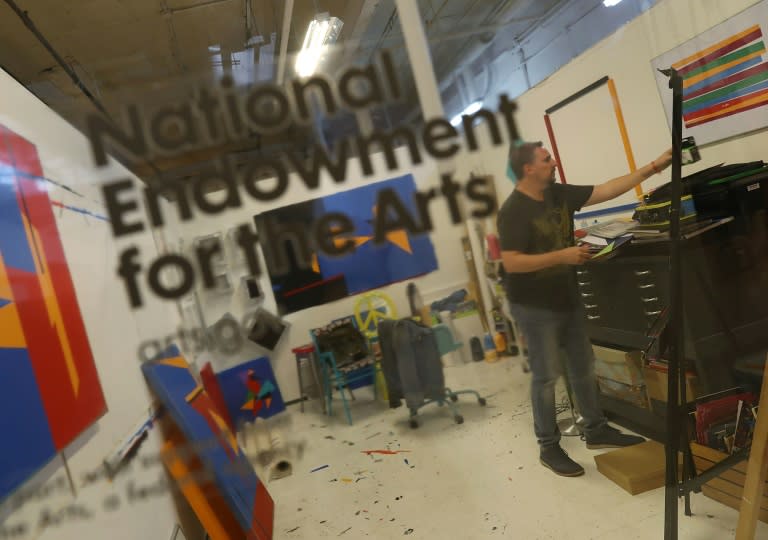Art world horrified by Trump's push to end funding
The art world is voicing horror at President Donald Trump's push to eliminate US cultural funding entirely, saying that poor and rural Americans will be hardest hit. In his first budget outline Thursday, Trump called for the complete end of federal support to public broadcasting and the National Endowment for the Arts as part of a trimming of government spending. Trump has also pushed for sweeping cuts to environmental protection, social services and foreign aid, although he is also advocating a major hike in military expenditure. "I put myself in the shoes of that steelworker in Ohio, the coal-mining family in West Virginia, the mother of two in Detroit, and I'm saying, okay, I have to go ask these folks for money and I have to tell them where I'm going to spend it," Trump's budget chief Mick Mulvaney told reporters. "Can I really go to those folks, look them in the eye and say, look, I want to take money from you and I want to give it to the Corporation (for) Public Broadcasting?" But arts advocates say that those most adversely affected will in fact be rural Americans and not a big-city elite against whom Trump frequently rails. The Corporation for Public Broadcasting (CPB), which this year marks its 50th anniversary, provides educational programming -- which can be rare on US television -- including seminal children's show "Sesame Street." A 2012 study by the corporation found that, in the case of a total end to federal funding, 54 local public television stations and 76 radio stations would risk shutting down. The elimination "would initially devastate and ultimately destroy public media's role in early childhood education, public safety, connecting citizens to our history and promoting civil discussions -- for Americans in both rural and urban communities," Patricia Harrison, CEO and president of the CPB, said in a statement Thursday. The National Endowment for the Arts -- which Trump hopes to shut down in two years -- brings music and other cultural programs to rural areas, some ravaged by addiction. - Sliver of federal spending - Previous Republican presidents also sought with mixed success to curb funding for the cultural world -- long a bugbear for conservatives who complain of artists' left-wing tiltings. Cultural funding is already far lower in the United States than in most of Europe, where governments often directly subsidize major institutions. The CPB in 2016 took $445 million, or 0.01 percent, of US federal spending, and the National Endowment of the Arts received $146 million, or 0.004 percent, in 2015. Public stations rely largely on donations, although sponsors only run announcements and not advertisements like on commercial networks. At WNET in New York City, federal funding accounts for only 15 percent of the budget, said Jeanne Ammermuller, the public station's director of institutional marketing. But that figure can go up to 50 percent in rural areas, said Robert Thompson, a professor at Syracuse University. Television choices have grown enormously in the past 50 years, with a growing number of viewers going online. Thompson, however, noted that public television produced much local programming that is often taken for granted, from history specials to local children's shows. And not all Americans can afford high-speed internet connections. "Those who are not purchasing broadcast services to cable or satellite -- those are the ones who are the most likely to be impacted," said Dominic Caristi, a professor at Ball State University in Indiana. - Fight ahead - In the art world, the most vulnerable institutions will paradoxically be the least expensive ones -- smaller museums and modest theater and music programs that do not have deep pockets. Thomas Campbell, director of New York's Metropolitan Museum of Art, said that federal funding was essential to smaller institutions around the country. The budget plan "is shortsighted and does a terrible disservice to the American people," he said in a statement. But many in the cultural world were confident about fighting to retain funding through Congress, which controls appropriations and where Trump's proposals have been met with skepticism. "We've been through this fight before, and we know that our legislators on both sides of the aisle appreciate our value," Ammermuller said.



